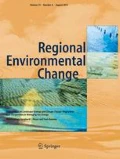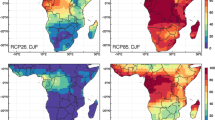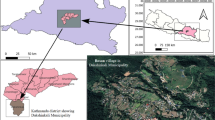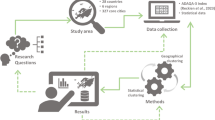Abstract
Climate risks and vulnerability continue to disproportionately affect the urban poor given their constrained adaptive capacity. This paper examines the urban poor’s perceptions and vulnerability to climate change in Kampala. Data was collected from a proportionate sample of 534 respondents drawn from households that were randomly selected from the city’s informal settlements and interviewed using a structured questionnaire. Six focus group discussions and 15 key informant interviews were conducted whose participants were purposively selected because of their knowledge and experiences. Quantitative data was analyzed using chi-square tests while content analysis was used to analyze qualitative data from key informant interviews and focus group discussions. A total of 96.6% of the households were aware of climate change, mainly perceived as rising temperatures and reduction in rainfall. Floods (53.4%) and droughts (27%) were the most commonly experienced climate risks, with the former considered more frequent and severe. Perceptions and vulnerability to climate risk varied with incomes, education level, marital status, main occupation, housing conditions and length of stay. Individuals with less wealth and education, employed in informal business and having insecure housing tenure were most vulnerable to flooding than they are to drought. The sensitivity of the urban poor communities is heightened by ecosystem degradation, poor access to urban infrastructure, utilities and services. With socio-economic attributes highly associated to climate change vulnerabilities, incorporating social dimensions and exchange of information between the vulnerable communities, planners and decision makers is necessary to inform the city’s adaptation policy and building long-term urban resilience. Partnerships are necessary between the urban authorities, communities, civil society and donors/financiers to improve housing and livelihoods in slums settlements. At the same time, strengthening co-production of climate information services, building climate change awareness, restoration of critical ecosystems and a broader inclusive adaptation planning are avenues for building resilient urban poor communities.

Similar content being viewed by others
Notes
US$1 was equivalent to Uganda Shillings (UGX) 3,571.43 at the time of study
The World Bank updated the international poverty line to $1.90 a day.
References
Adger WN, Huq S, Brown K, Conway D, Hulme M (2003) Adaptation to climate change in the developing world. Prog Dev Stud 3(3):179–195. https://doi.org/10.1191/1464993403ps060oa
Ampaire EL, Jassogne L, Providence H, Acosta M, Twyman J et al (2017) Institutional challenges to climate change adaptation: a case study on policy action gaps in Uganda. Environ Sci Pol 75:81–90. https://doi.org/10.1016/j.envsci.2017.05.013
Arnalsteen L, Van de Walle J, Brousse O, Vanhaeren R, Nsangi G et al (2019) How can we improve the representation of cities in a climate model for East Africa? Geophys Res Abstrar 21:1–1
Berman RJ, Quinn CH, Paavola J (2015) Identifying drivers of household coping strategies to multiple climatic hazards in Western Uganda: implications for adapting to future climate change. Clim Dev 7(1):71–84. https://doi.org/10.1080/17565529.2014.902355
Brundtland GH, Ehrlich P, Goldemberg J, Hansen J, Lovins A, et al (2012) Environment and development challenges: the imperative to act. The Asahi Glass Foundation, Tokyo
Bryman A (2016) Social research methods. Oxford university press
CDKN (2014) CDKN Annual Report 2014: Inspiring climate compatible development. Climate and Development Knowledge Network (CDKN). https://cdkn.org/2014/08/cdkn-annual-report-2014/
Cooper SJ, Wheeler T (2017) Rural household vulnerability to climate risk in Uganda. Reg Environ Chang 17(3):649–663. https://doi.org/10.1007/s10113-016-1049-5
Eakin H, Luers AL (2006) Assessing the vulnerability of social-environmental systems. Annu Rev Environ Resour 31:365–394. https://doi.org/10.1146/annurev.energy.30.050504.144352
Elum ZA, Modise DM, Marr A (2017) Farmer’s perception of climate change and responsive strategies in three selected provinces of South Africa. Clim Risk Manag 16:246–257. https://doi.org/10.1016/j.crm.2016.11.001
FSD Africa (2015) National Small Businesses Survey of Uganda. Financial Sector Deepening (FSD Uganda), Kampala, Uganda
Gasper R, Blohm A, Ruth M (2011) Social and economic impacts of climate change on the urban environment. Curr Opin Environ Sustain 3(3):150–157. https://doi.org/10.1016/j.cosust.2010.12.009
Government of Uganda (2015) Uganda Second National Development Plan (NDP II). Green Growth Knowledge Platform. https://www.greengrowthknowledge.org/national-documents/uganda-second-national-development-plan-ndp-ii
Grothmann T, Patt A (2005) Adaptive capacity and human cognition: the process of individual adaptation to climate change. Glob Environ Chang 15(3):199–213. https://doi.org/10.1016/j.gloenvcha.2005.01.002
Hartig T, Kaiser FG, Bowler PA (2001) Psychological restoration in nature as a positive motivation for ecological behavior. Environ Behav 33(4):590–607. https://doi.org/10.1177/00139160121973142
IPCC (2001) Climate change 2001: the scientific basis. In: Houghton JT, Ding Y, Griggs DJ, Noguer M, van der Linden PJ, Dai X, Maskell K, Johnson CA (eds) Contribution of working group I to the third assessment report of the intergovernmental panel on climate change. Cambridge University Press, Cambridge and New York, pp 881
IPCC (2013) Climate change 2013: the physical science basis. In: Stocker TF, Qin D, Plattner G-K, Tignor M, Allen SK, Boschung J, Nauels A, Xia Y, Bex V, Midgley PM (eds) Contribution of working group I to the fifth assessment report of the intergovernmental panel on climate change. Cambridge University Press, Cambridge and New York, pp 1535
IPCC (2014) Climate change 2014: mitigation of climate change. In: Edenhofer O, Pichs-Madruga R, Sokona Y, Farahani E, Kadner S, Seyboth K, Adler A, Baum I, Brunner S, Eickemeier P, Kriemann B, Savolainen J, Schlömer S, von Stechow C, Zwickel T, Minx JC (eds) Contribution of working group III to the fifth assessment report of the intergovernmental panel on climate change. Cambridge University Press, Cambridge and New York
Isunju JB, Orach CG, Kemp J (2016) Hazards and vulnerabilities among informal wetland communities in Kampala, Uganda. Environ Urban 28(1):275–293. https://doi.org/10.1177/0956247815613689
Jabeen H, Johnson C (2013) Perceptions of climate variability and coping strategies in informal settlements in Dhaka, Bangladesh. In H Joffe, T Rossetto, & J. Adams (Eds.), Cities at Risk: Living with Perils in the 21st Century (149–170). Springer Netherlands. https://doi.org/10.1007/978-94-007-6184-1_9
Kabwama SN, Bulage L, Nsubuga F, Pande G, Oguttu DW et al (2017) A large and persistent outbreak of typhoid fever caused by consuming contaminated water and street-vended beverages: Kampala, Uganda, January – June 2015. BMC Public Health 17(1):23. https://doi.org/10.1186/s12889-016-4002-0
Kaptengan D (2018) Prevalence and factors associated with Diarrhoea among children under-five and household adaptation strategies in flash flood prone Bwaise II and III parishes, Kawempe Division, Kampala Uganda [Thesis, Makerere University]. http://makir.mak.ac.ug/handle/10570/7245
KCCA (2014) KCCA Strategic Plan 2014/15 – 2018/19. Kampala Capital City Authority (KCCA), Kampala, Uganda
KCCA (2015) Kampala Climate Change Action. Kampala Capital City Authority (KCCA), Kampala, Uganda
KCCA (2017) Energy and Climate Profile. Kampala Capital City Authourity (KCCA), Kampala, Uganda
KCCA (2020) Kampala Strategic Plan 2020/21 to 2024 /25. Kampala Capital City Authourity (KCCA), Kampala, Uganda
Krejcie RV, Morgan DW (1970) Determining sample size for research activities. Educ Psychol Meas 30(3):607–610. https://doi.org/10.1177/001316447003000308
Kusakari Y, Asubonteng KO, Jasaw GS, Dayour F, Dzivenu T et al (2014) Farmer-perceived effects of climate change on livelihoods in Wa West District, Upper West region of Ghana. JDisaster Res 9(4):516–528. https://doi.org/10.20965/jdr.2014.p0516
Lwasa S, Owens K (2018) Kampala: Rebuilding Public Sector Legitimacy with A New Approach to Sanitation Services (Case Study) [Towards a More Equal City]. World Resources Institute. https://www.wri.org/wri-citiesforall/publication/kampala-rebuilding-public-sector-legitimacy-new-approach-sanitation
Lwasa S, Koojo C, Mabirizi F, Mukwaya P, Sekimpi D (2011) Vulnerability assessment of climate change in Kampala and Uganda. Final Report. UN-HABITAT, SUD-NET Climate Change Initiative, Nairobi, Kenya
Lwasa S, Mugagga F, Wahab B, Simon D, Connors JP et al (2015) A meta-analysis of urban and peri-urban agriculture and forestry in mediating climate change. Curr Opin Environ Sustain 13:68–73. https://doi.org/10.1016/j.cosust.2015.02.003
Mabasi T (2009) Assessing the impacts, vulnerability, mitigation, and adaptation to climate change in Kampala city. World Bank Fifth Urban Research Symposium, Marseille, France, 28–30
Markandya A, Cabot-Venton C, Beucher O (2015) Economic assessment of the impacts of climate change in Uganda. Climate Development and Knowledge Network (CDKN), Pretoria, South Africa
Marx B, Stoker T, Suri T (2013) The economics of slums in the developing world. J Econ Perspect 27(4):187–210. https://doi.org/10.1257/jep.27.4.187
McQuaid K, Vanderbeck RM, Valentine G, Liu C, Chen L et al (2018) Urban climate change, livelihood vulnerability and narratives of generational responsibility in Jinja, Uganda. Cambridge University Press, Africa 88(1):11–37. https://doi.org/10.1017/S0001972017000547
Mcsweeney C, New M, Lizcano G, Lu X (2010) The UNDP Climate Change Country Profiles: Improving the accessibility of observed and projected climate information for studies of climate change in developing countries. Bull Am Meteorol Soc 91(2):157–166. https://doi.org/10.1175/2009BAMS2826.1
Mearns R, Norton A (2009) The social dimensions of climate change: Equity and vulnerability in a warming world. The World Bank
Moser SC (2010) Communicating climate change: history, challenges, process and future directions. Wiley Interdiscip Rev Clim Chang 1(1):31–53. https://doi.org/10.1002/wcc.11
Moser SC (2014) Communicating adaptation to climate change: The art and science of public engagement when climate change comes home. Wiley Interdiscip Rev Clim Chang 5(3):337–358. https://doi.org/10.1002/wcc.276
Moser C, Satterthwaite D (2010) Toward pro-poor adaptation to climate change in the urban centers of low-and middle-income countries (231–258). World Bank
Moser C, Norton A, Stein A, Georgieva S (2010) Pro-Poor adaptation to climate change in urban centers: Case studies of vulnerability and resilience in Kenya and Nicaragua. World Bank. https://openknowledge.worldbank.org/handle/10986/2153
Okonya JS, Syndikus K, Kroschel J (2013) Farmers’ perception of and coping strategies to climate change: evidence from six Agro-Ecological zones of Uganda. J Agric Sci 5(8):252. https://doi.org/10.5539/jas.v5n8p252
Parry M, Arnell N, Berry P, Dodman D, Fankhauser S, et al (2009) Assessing the costs of adaptation to climate change: a review of the UNFCCC and other recent estimates. International Institute of Environment and Development (IIED) and Imperial College London
Ramamurthy P, Bou-Zeid E (2017) Heatwaves and urban heat islands: a comparative analysis of multiple cities. J Geophys Res-Atmos 122(1):168–178. https://doi.org/10.1002/2016JD025357
Rautenbach H (2014) Regional-scale Climate Change Projections of Annual. Seasonal and Monthly Near-Surface Temperatures and Rainfall in Uganda. Report for Climate Change Unit. Ministry of Water and Environment and Climate and Development Knowledge Network (CDKN)
Roy M, Cawood S, Hordijk M, Hulme D (2016) Urban poverty and climate change: life in the slums of Asia, Africa and Latin America. Routledge
Sandink D (2009) Urban flooding, homeowner hazard perceptions, and climate change. Public Sector Digest Winter 35–39
Satterthwaite D (2011) How urban societies can adapt to resource shortage and climate change. Philos Trans R Soc A Math Phys Eng Sci 369(1942):1762–1783. https://doi.org/10.1098/rsta.2010.0350
Satterthwaite D, Archer D, Colenbrander S, Dodman D, Hardoy J et al (2020) Building resilience to climate change in informal settlements. One Earth 2(2):143–156. https://doi.org/10.1098/rsta.2010.0350
Shah KU, Dulal HB, Johnson C, Baptiste A (2013) Understanding livelihood vulnerability to climate change: applying the livelihood vulnerability index in Trinidad and Tobago. Geoforum 47:125–137. https://doi.org/10.1016/j.geoforum.2013.04.004
Sliuzas R, Flacke J, Jetten V (2013a) Modelling urbanization and flooding in Kampala, Uganda. Proceedings of the 14th N-AERUS/GISDECO Conference, 12–14
Sliuzas RV, Jetten VG, Flacke J, Lwasa S, Wasige EJ et al (2013b) Flood risk assessment, strategies and actions for improving flood risk management in Kampala: final report of integrated flood management project Kampala. Department of Urban and Regional Planning and Geo-Information ManagementUT-I-ITC-PLUS Faculty of Geo-Information Science and Earth Observation Department of Earth Systems AnalysisUT-I-ITC-4DEarthDepartment of Natural Resources, Netherlands
Sseviiri H (2019) Analysis of Value and Power in Kampala’s Solid Waste Recycling Infrastructure [Thesis, Makerere University]. http://makir.mak.ac.ug/handle/10570/7840
Sseviiri H, Lwasa S, Lawhon M, Ernstson H, Twinomuhangi R (2020) Claiming value in a heterogeneous solid waste configuration in Kampala. Urban Geogr:1–22. https://doi.org/10.1080/02723638.2020.1828557
Taylor A, Peter C (2014) Strengthening Climate Resilience in African Cities A Framework for Working with Informality. Climate and Development Knowledge Network (CDKN) and African Centre for Cities
Taylor T, Markandya A, Droogers P, Rugumayo A, Beucher O (2015) Economic Assessment of the Impacts of Climate Change in Uganda (43). Ministry of Water and Environment. https://www.futurewater.eu/wp-content/uploads/2015/03/Impacts-of-CC-in-Uganda-Water_v3-clean-final.pdf
Twinomuhangi R (2010) The use of geo-information technology in sustainable solid waste management in Kampala city [PhD Thesis, Makerere University]. https://cedat.mak.ac.ug/publications/mapping-out-the-solid-waste-generation-and-collection-models-the-case-of-kampala-city/
Twinomuhangi R (2018) Uganda national urban climate change profile: UNDP, Kampala, Uganda
Twinomuhangi R, Monkhouse C (2015) Economic assessment of the impacts of climate change on Uganda: Key results
Twinomuhangi R, Sseviiri H (2020) Baseline study: strengthening capacity for urban migration management and migrants’ livelihood improvement in Jinja, Uganda. Cities Alliance
UBOS (2012) Uganda National Household Survey 2009/2010. Uganda Bureau of Statistics, Kampala, Uganda. https://www.ubos.org/microdata/index.php/catalog/55/related-materials
UBOS (2014) National Census Main Report (105). Uganda Bureau of Statistics. https://www.ubos.org/wp-content/uploads/publications/03_20182014_National_Census_Main_Report.pdf
UBOS (2016) National Population and Housing Census 2014: Main Report. Uganda Bureau of Statistics. https://www.ubos.org/wp-content/uploads/publications/03_20182014_National_Census_Main_Report.pdf
UBOS (2017) National Population and Housing Census 2014, Area Specific Profiles: Rubirizi. Uganda Bureau of Statistics. https://www.ubos.org/wp-content/uploads/publications/2014CensusProfiles/RUBIRIZI.pdf
UN-HABITAT (2012) Kampala, Uganda: Climate Change Assessment. UN-HABITAT. https://oldweb.unhabitat.org/books/climate-change-assessment-for-kampala-uganda/
UN-Habitat (2016a) Slum Almanac 2015/2016: Tracking Improvement in the Lives of Slum Dwellers. UN-Habitat
UN-Habitat (2016b) Urbanization and development: emerging futures (4–51) [World Cities Report]. UN-Habitat
United Nations (2015) Cities—United Nations Sustainable Development Action United Nations Sustainable Development. https://www.un.org/sustainabledevelopment/cities/
USAID (2013) Uganda climate change vulnerability assessment report. Consultancy report for the African and Latin American Resilience to Climate Change (ARCC) project. United States Agency for International Development (USAID)
USAID (2015) Climate Information Factsheet: Uganda. United States Agency for International Development (USAID). https://www.climatelinks.org/resources/climate-information-factsheet-uganda
Vermeiren K, Van Rompaey A, Loopmans M, Serwajja E, Mukwaya P (2012) Urban growth of Kampala, Uganda: Pattern analysis and scenario development. Landsc Urban Plan 106(2):199–206. https://doi.org/10.1016/j.landurbplan.2012.03.006
World Bank Group (2015) Uganda: Climate Profile. World Bank. http://muccri.mak.ac.ug/sites/default/files/Publications/Climate%20Profile%20for%20Uganda.pdf
Acknowledgements
The authors are grateful to the funding support the Makerere-SIDA programme and to KCCA and civil society officials, and the people of Kampala for the valuable time offered during the study.
Author information
Authors and Affiliations
Corresponding author
Ethics declarations
Conflict of interest
The authors declare no competing interests.
Additional information
Communicated by Shuaib Lwasa
Publisher’s note
Springer Nature remains neutral with regard to jurisdictional claims in published maps and institutional affiliations.
Rights and permissions
About this article
Cite this article
Twinomuhangi, R., Sseviiri, H., Mulinde, C. et al. Perceptions and vulnerability to climate change among the urban poor in Kampala City, Uganda. Reg Environ Change 21, 39 (2021). https://doi.org/10.1007/s10113-021-01771-5
Received:
Accepted:
Published:
DOI: https://doi.org/10.1007/s10113-021-01771-5




